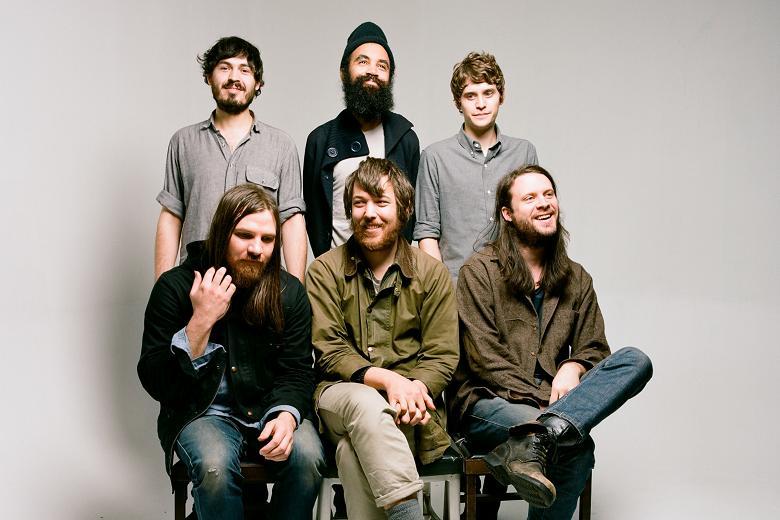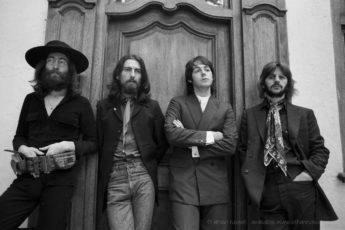
 In 2008, following the release of their EP “Sun Giant” and then their self-titled full-length major label release, the heretofore little known Seattle band Fleet Foxes had, quite surprisingly, become a pretty big deal. That debut album, which The Guardian matter of factly described as “A landmark in American music,” was put out on Sub-Pop Records, home of other rather notable Seattle bands Nirvana, Soundgarden and Mudhoney, and birthplace of the mammoth early-‘90’s movement that became known as grunge. Yet, the sound on “Fleet Foxes” was nothing like the blunt, distorted thud of grunge music. In fact, if there was an antithesis to grunge, Fleet Foxes’ chamber-pop psychadelia had given life to it with an intricate quilt of Appalachian folk hymns and lush, even baroque-styled arrangements. Amazingly, this had proven to be quite popular, both critically and commercially: “Fleet Foxes” was named album of the year by Pitchfork and Billboard, tallied big unit sales in both the U.S. and Europe, and led to sold-out tours of Australia, New Zealand and the U.K., and an appearance on Saturday Night Live.
In 2008, following the release of their EP “Sun Giant” and then their self-titled full-length major label release, the heretofore little known Seattle band Fleet Foxes had, quite surprisingly, become a pretty big deal. That debut album, which The Guardian matter of factly described as “A landmark in American music,” was put out on Sub-Pop Records, home of other rather notable Seattle bands Nirvana, Soundgarden and Mudhoney, and birthplace of the mammoth early-‘90’s movement that became known as grunge. Yet, the sound on “Fleet Foxes” was nothing like the blunt, distorted thud of grunge music. In fact, if there was an antithesis to grunge, Fleet Foxes’ chamber-pop psychadelia had given life to it with an intricate quilt of Appalachian folk hymns and lush, even baroque-styled arrangements. Amazingly, this had proven to be quite popular, both critically and commercially: “Fleet Foxes” was named album of the year by Pitchfork and Billboard, tallied big unit sales in both the U.S. and Europe, and led to sold-out tours of Australia, New Zealand and the U.K., and an appearance on Saturday Night Live.All of which put a lot of pressure on the then-22-year-old Robin Pecknold, the band’s principal songwriter and vocalist, in crafting a suitably meritorious follow-up record. With plans to release it the following year, work quickly began at a rented house outside Seattle. But output frequently became derailed and its difficult, sometimes draining sessions were ultimately scrapped. Taking a revamped direction by 2010, Pecknold resolved that he wanted the band to “very quickly” record his new batch of songs. “If there are mistakes I want them to be on there,” he explained. “Van Morrison’s Astral Weeks, to me, is the best sounding album because it sounds like there were only six hours in the universe for that album to be recorded. I want it to have that feeling, that cohesive sound.” This reimagined plan, in turn, didn’t quite work out either. After two years of writing material and intermittent attempts at recording in multiple locations, Pecknold and the band were essentially, once again, starting over.
It was during this time that Pecknold’s relationship with his beloved girlfriend of five years, Olivia, also reached a breaking point. “I became hard to be around,” Pecknold conceded. “I was f*cking up in terms of being present. She’d say, ‘What are you thinking about?’ and I’d be like, ‘The third lyric of…’ I was self-obsessed, and it didn’t leave a lot of mental space for her.” A disheartened Olivia eventually dumped him, leaving Pecknold near depression. But rather than retrench, the couple’s painful split only drove Pecknold’s all-consuming ardor further. “If this (process) was going to have affected all these other things in my life in such a crappy way,” he reasoned, “I needed the record to be perfect.”
The result was 2011’s heavenly “Helplessness Blues,” a breathtaking monument to indie-folk-rock mastery, and something I could only describe as almost laughably beautiful. Highlighting the ambitious, romantic, gargantuan sound – surely inspired by having grown up on a steady diet of Crosby, Stills, Nash & Young, the Beach Boys and Simon & Garfunkel – were the multi-layered, interwoven Fleet Foxes voices. Rolling Stone wrote “Helplessness Blues is capped with signature vocal arrangements that you might call angelic – if they didn’t sound so piercingly, poignantly human.” Similar sentiments arrived from across the music industry spectrum: “Helplessness Blues” appeared on best-of 2011 lists by not only Rolling Stone but Pitchfork, Paste, Spin, Stereogum, Consequence of Sound, Uncut, The Guardian, and PopMatters, where it was slotted at #1. The most telling review, though, undoubtedly came from ex-girlfriend Olivia. “If this is why we broke up,” she’d said upon hearing it, “then I guess it was worth it.”
This, the divine and striking title track, might be a song about trying to find some ungraspable meaning in one’s life. Or it might be a song about orchards. Nonetheless, what it is most certainly is exquisitely, unspeakably beautiful. A sonic masterpiece. And, apparently, something deemed entirely worthy of extinguishing treasured, long-term relationships. Have a listen and see if you wouldn’t agree.
I was raised up believing I was somehow unique
Like a snowflake distinct among snowflakes, unique in each way you can see
And now after some thinking, I’d say I’d rather be
A functioning cog in some great machinery serving something beyond me
But I don’t, I don’t know what that will be
I’ll get back to you someday soon you will see
What’s my name, what’s my station? Oh, just tell me what I should do
I don’t need to be kind to the armies of night that would do such injustice to you
Or bow down and be grateful and say, “Sure, take all that you see”
To the men who move only in dimly-lit halls and determine my future for me
And I don’t, I don’t know who to believe
I’ll get back to you someday soon you will see
If I know only one thing, it’s that everything that I see
Of the world outside is so inconceivable often I barely can speak
Yeah I’m tongue-tied and dizzy and I can’t keep it to myself
What good is it to sing helplessness blues, why should I wait for anyone else?
And I know, I know you will keep me on the shelf
I’ll come back to you someday soon myself
If I had an orchard, I’d work ’til I’m raw
If I had an orchard, I’d work ’til I’m sore
And you would wait tables and soon run the store
Gold hair in the sunlight, my light in the dawn
If I had an orchard, I’d work ’til I’m sore
If I had an orchard, I’d work ’til I’m sore
Someday I’ll be like the man on the screen






Cyndy
July 31, 2021 7:26 amI have had this album for quite a while now and it’s one of my absolute favorites!!!! Absolutely!